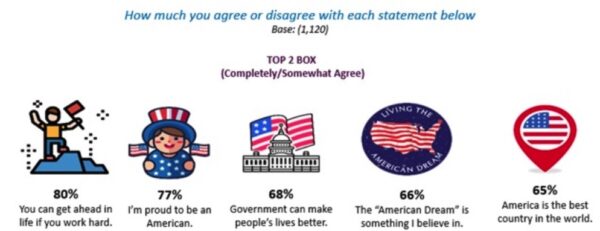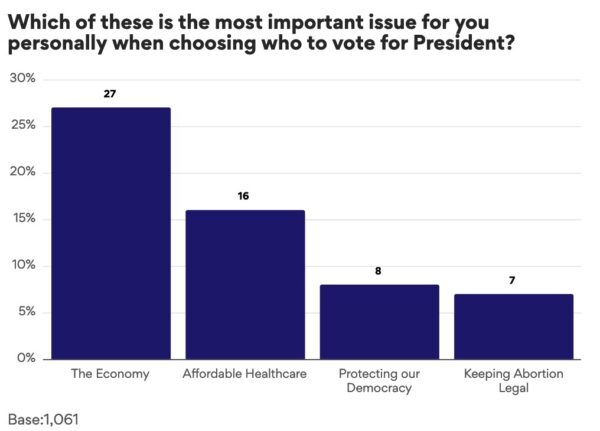Understanding Latino Voters: How Core Values and Beliefs Affect Their Political Identity [REPORT]
August 23, 2024

Latino voters are emerging as an influential force in U.S. elections, and political parties should take notice. The percentage of Latino voters in the U.S. electorate is expected to grow from 10.6% in 2020 to 11.1% in 2024. In key swing states like Nevada and Arizona, they already make up 18.7% and 23.5% of voters, respectively. This growth is expected to continue in the foreseeable future. This growing demographic has the potential to sway the outcome of key races, particularly in swing states.
To gain deeper insights into their voting behavior, ThinkNow and Culture IQ Group teamed up to conduct a nationwide online survey among 1,120 likely Latino Voters in the 2024 election cycle and follow-up qualitative interviews to delve deeper into their political identity.
This comprehensive Latino research study sheds light on the key issues that resonate with Latino voters, their communication habits, and their attitudes toward the upcoming election. Here’s what we learned:
Shared Values
Latino voters across the political spectrum share common values, with patriotism and belief in the American Dream serving as unifying themes. Regardless of party affiliation, Latino voters view themselves as hard-working individuals who are committed to improving their lives. This belief in the power of hard work is complemented by a recognition that the government can play a role in enhancing their quality of life.

The survey, however, also revealed a generational shift in other values, like religion. Religiosity is waning, particularly among younger Latinos and those who primarily speak English. This trend may influence how candidates address social issues and frame their messaging to appeal to different segments of the Latino electorate.
The Economy, Healthcare, Democracy, and Social Issues
When it comes to the issues that matter most, Latino voters are focused on both economic and social concerns. Unsurprisingly, the economy and affordable healthcare remain top priorities for this demographic. With the recent spike in inflation and rising healthcare costs affecting many households, Latino voters are looking for candidates who can address these pressing challenges.
In addition to economic concerns, issues related to democracy and social justice are also top priorities. A significant number of Latino voters identified protecting democracy and keeping abortion legal as key concerns. This reflects the broader national conversation about voting rights, election integrity, and reproductive rights.

Latino voters also demonstrated support for the LGBTQ+ community, particularly among Latino Democrats and those who consume English-language media. This support extends to diversity and inclusion efforts in hiring practices, with Latino voters from all political backgrounds expressing a commitment to ensuring fairness and representation in the workplace.
Immigration, a perennial issue for Latino voters, revealed nuanced perspectives. Latino Republicans are more likely to prioritize tighter border security, while Spanish-dominant Latinos express stronger support for immigrants and refugees. Meanwhile, Democratic and Independent Latino voters back a path to citizenship for undocumented immigrants. These diverse viewpoints highlight the importance of understanding the varied experiences and priorities within the Latino community.
Political Views
The survey also explored Latino voters’ attitudes toward the electoral process and candidates. Notably, 57% of Independent Latino voters expressed doubts about whether the 2024 presidential election will be free and fair. This skepticism reflects broader concerns about election integrity and disinformation, which have become prominent issues in recent election cycles.
Awareness of former President Donald Trump’s criminal conviction is widespread among Latino voters, with 90% acknowledging it. Among younger and Independent voters, this has led to a significant decrease in support for Trump. The reverse is true, whoever, for Latinos who identify as Republicans with Trump’s criminal conviction increasing his support.
Communication Channels
Understanding how Latino voters consume political information is crucial for campaigns looking to engage this key demographic. Television news remains the top source of political news for Latino voters, underscoring the continued relevance of traditional media. However, digital platforms are also gaining ground.
YouTube and Facebook are among the most popular online platforms for political news, particularly among Latino voters. These platforms offer a mix of video content, news articles, and social media engagement, allowing voters to access information in various formats.
TikTok, a platform known for its short-form videos, is making inroads with Latino Democrats, Independents, and Gen Z voters. Its rising popularity as a political news source reflects broader trends in how younger voters engage with information, favoring quick, accessible content over traditional news formats. This presents both opportunities and challenges for campaigns aiming to connect with these voters in meaningful ways.
The Undecideds
Undecided Latino voters present a unique challenge for both parties. While they share concerns about the economy and affordable healthcare, these voters also align more closely with progressive stances on abortion rights, similar to supporters of Vice President Kamala Harris.
Despite their support for progressive social issues, undecided Latino voters tend to describe themselves as “traditional,” reflecting a complex interplay between their personal values and political preferences. Understanding this balance is crucial for campaigns looking to sway undecided Latino voters in the final stretch of the election.
Swing State Voters
Latino voters in swing states represent a particularly important group, with the potential to determine the outcome of the 2024 election. However, their views are not monolithic. The survey revealed that country of origin and descent vary widely among Latino voters in these states, influencing their political preferences and priorities.
For example, Latino voters in North Carolina demonstrated the highest levels of support for progressive issues, including LGBTQ+ rights and abortion access. They are also the most likely to support a path to citizenship for immigrants already in the country and are more likely to consume Spanish-language media than their counterparts in other states.
In contrast, Latino voters in Michigan are particularly focused on protecting democracy, reflecting concerns about election integrity and the future of democratic governance. These state-specific differences highlight the importance of tailoring campaign messages to resonate with Latino voters’ unique experiences and priorities.
Gaining Latino Voters’ Support
There is no question that Latino voters will play a crucial role in shaping the outcome of the 2024 presidential election. While economic issues remain top of mind, Latino voters are also equally invested in social justice and democracy-related issues, making them a key contingent to engage in the months ahead. While Latinos share many core values, winning political strategies lie in understanding their differences. Campaigns that can effectively connect with Latino voters on the issues they care about will be well-positioned to secure their support in this pivotal election.
https://thinknow.com/newsite/wp-content/uploads/2024/08/ThinkNow-Latino-Voters-Report-2024.pdf



























